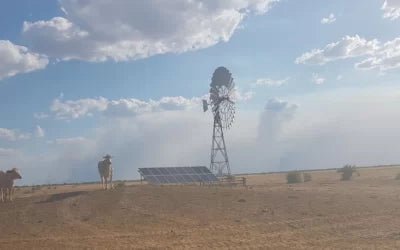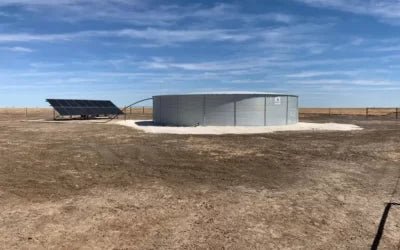Although windmills have served Australian farmlands for many decades, their traditional structures have revealed numerous limitations. As the demands of agriculturalists continue to transcend, many are seeking more efficient water pumping technology. Solar pumps have emerged as the more modern, reliable and sustainable solution.
In this article, we provide context for why hundreds of outdated windmills exist across the country and present the case for why solar pumps make the obvious choice to replace this archaic technology.
The History of Windmill Pumps in Australia
Since the mid 19th century, windmills were an essential component for rural farmers in Australia. These complex mechanisms became sought after solutions for agricultural endeavours, including transferring water from water sources such as bores and dams.Between the 19th and 20th century, windmills progressed in popularity, leaving the majority of Australian farmlands dependent on these traditional systems. During this period of mass production, windmills became the backbone of Australian agriculture, enabling irrigation, livestock watering, and meeting household water needs in rural locations.
Five Major Issues With Outdated Windmill Pumps
Outdated windmill pumps present a variety of concerns that can significantly disrupt the productivity of a farm.
Here are five major issues of Windmill Pumps to consider:
- Require labour intensive maintenance.
- Prone to malfunctioning making them unreliable.
- Deteriorating structures present other health and safety issues.
- They rely on wind power which can be inconsistent and on the decline especially with conditions of drought which are synonymous with El Nino weather systems.
- They lack scalability and adaptability making them unsuitable to changing water demands.
Solar pumps have surfaced as a pioneering solution to water management. This innovative technology marries innovation with sustainability, revolutionising how agriculturalists manage their water distribution.
Transitioning from outdated windmill pumps to modern solar pumps presents agriculturalists with numerous benefits. For instance, solar pumps harness the sun’s renewable energy and present low maintenance due to fewer complex components.
This switch to solar pumps demonstrates the progressive mentality of agriculture, by embracing technology that both maximises farming productivity, while concurrently minimising environmental impacts.
Case Study: Replacing Old Windmills with LORENTZ Solar PumpsWindmills have remained prominent water pump solutions for agriculturalists for centuries. However, as we have transitioned into modern day these systems have significantly weakened, burdening agriculturalists with safety risks and costly maintenance expenses.
LORENTZ dealer Justin Stoddart identified that the LORENTZ PS2 Solar Pump combined with a water level measurement solution (WLMS) would sufficiently meet his clients needs. This enabled them to seamlessly switch from windmill water pumps to solar pump technology to provide water to travelling stock.
Thanks to specialised LORENTZ features, such as manual speed controls and WLMS, the solar pump was able to successfully accommodate the client’s daily watering needs, offering an efficient and modern alternative to old windmill water pumps.

The Benefits of Solar Pumps
From scalability to energy efficiency, solar pumps present an array of cutting-edge features that will undoubtedly revolutionise how you manage water during agricultural endeavours. Explore the major modern features of these pioneering systems alongside key benefits to understand why solar pumps make advantageous alternatives for agriculturalists:
Off-Grid Operation
Solar pumps are independent of grid electricity or fuel, making them ideal for off-grid farms while minimising operational costs.
Environmentally Friendly
Solar pumps use clean and renewable energy from the sun to produce electricity, without the need for pollutant emissions, such as combustion of fuels.
Variable Speed Operation
With LORENTZ, you can adjust the pumping speed of selected solar pumps based on water source levels, your farm’s water demand and sunlight availability. This means total water control.
Energy Efficiency
Because solar pumps directly convert natural sunlight into electricity, they excel in energy efficiency, offering renewable, affordable and eco-friendly power generation. Due to emerging technology, solar panels present minimal energy waste and can even sufficiently operate during cloudy weather.
Scalability
Solar pumps offer the flexibility of scalability, allowing you to expand your systems by incorporating more solar panels and enabling you to adjust your pump capacity to meet your demands.
Low Maintenance
Unlike other water pump systems, solar pumps feature fewer moving components and simpler mechanisms. This not only minimises the downtime and repair expenses required to repair faults, but also encourages reliable and efficient production, ensuring crops and livestock receive a continuous supply of water.
Remote Monitoring and Management
Modern solar pumps, such as LORENTZ, are equipped with remote monitoring and management technology. This allows you to manage your systems remotely in real-time, saving time from on-site visits, and offering you the flexibility to focus on other important tasks.
Water Level Measurement Solution (WLMS)
Some solar pumps, such as LORENTZ, feature integrated water level measurement solutions. This allows you to precisely monitor water levels in various sources, offering a data-driven approach to sustainable water use and optimised operation.
Lower Operational Costs
Because solar pumps utilise solar energy, they eliminate or reduce the expenses of grid electricity and fuel. This will save you money in the long-run, and subsequently elevate the profitability of your agriculture business.
Water Conservation
Through precise scheduling, scalability, and controlled water distribution, solar pumps present unparalleled water conservation.
Low Noise
Compared to traditional water pumps, solar pumps produce minimal noise when operating. This facilitates a peaceful, less disruptive environment, ensuring nearby residents and livestock are not burdened by unwanted sounds.







